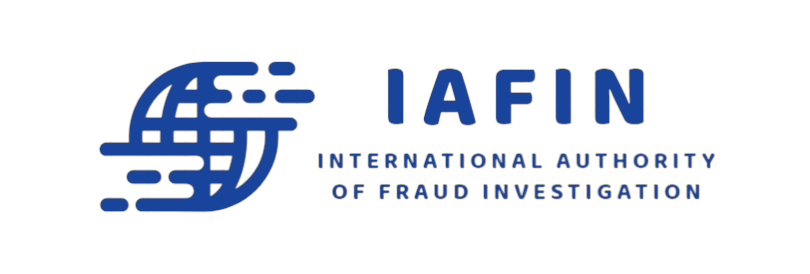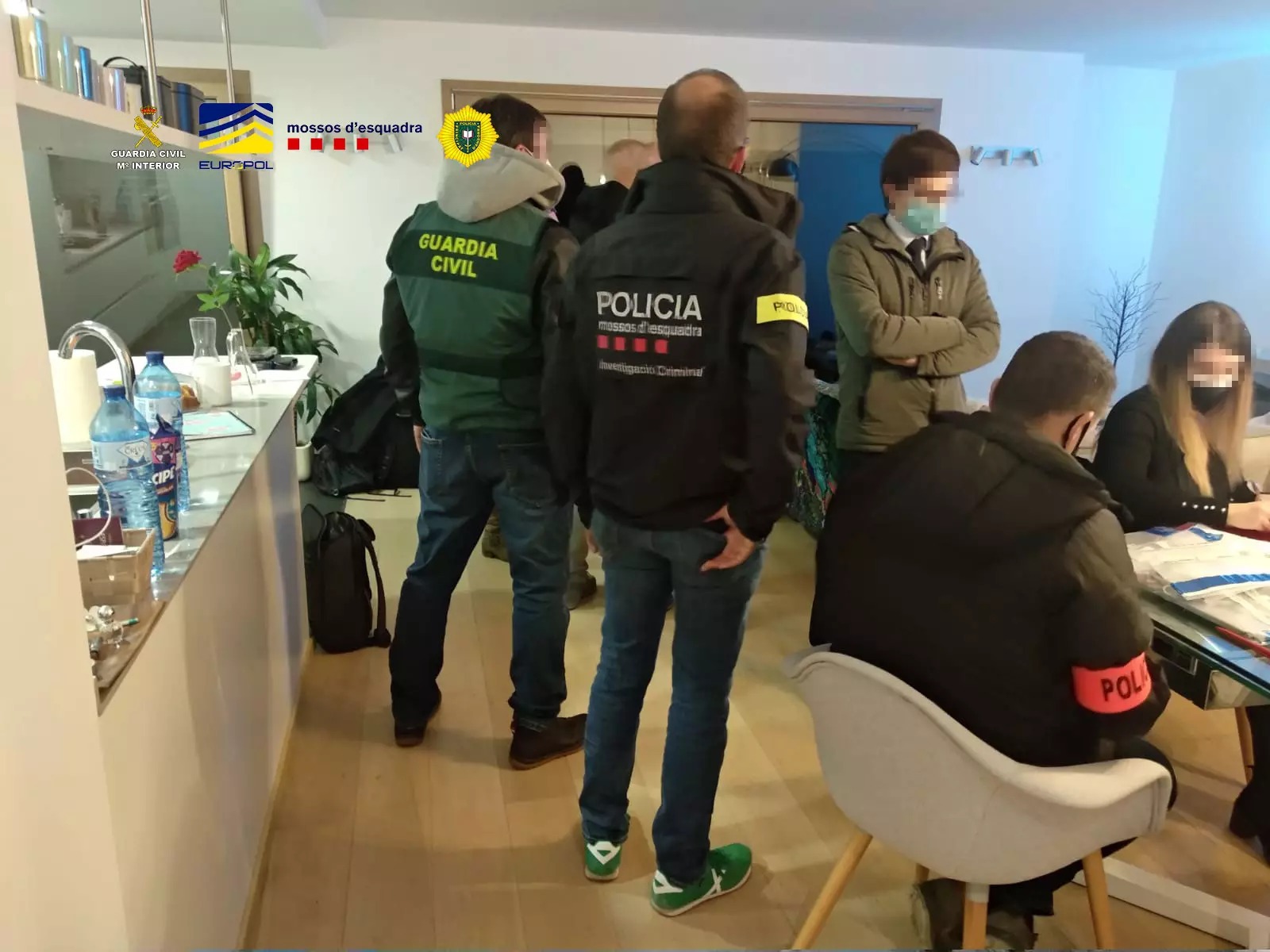(Rheinland Pflaz Police)
In a rare move, Israeli police last month arrested a suspect in an alleged €30 million ($36 million) investment scam, according to Europol.
In a cross-border “action day” that took place on May 11, five people were arrested in Bulgaria and one in Israel, in connection with what Europol described as “a fraud scheme organized mainly by Israeli nationals.”
Five other suspects were arrested in Spain at an earlier date.
The action was led by German police with the cooperation of law enforcement from Bulgaria, Israel, Latvia, North Macedonia, Poland, Spain and Sweden.
A Sofia call center that was searched by police on May 11. 2021 in connection with suspicions against the websites Tradorax, Tradervc, Kayafx, Kontofx and Libramarkets (Rheinland Pflaz police)
The alleged fraud scheme involved call centers run from Bulgaria and North Macedonia. European losses from the alleged fraud scheme amounted to an estimated €30 million.
Get The Times of Israel’s Daily Editionby email and never miss our top storiesNewsletter email addressGET IT
By signing up, you agree to the terms
A source with knowledge of the investigation told The Times of Israel that the suspects had operated the allegedly fraudulent online trading websites Tradorax, Tradervc, Kayafx, Kontofx and Libramarkets. The sites offered investments in binary options, CFDs, and cryptocurrencies.
Tradorax used the platform supplied by Israel’s SpotOption, which was charged with fraud by the US Securities and Exchange Commission in April, while TraderVC and Libramarkets used a software platform known as Panda TS.
According to Europol, the criminal network allegedly lured thousands of victims through advertising on social media and search engines. These victims were then allegedly induced to invest in high-risk options, CFDs or cryptocurrencies. However, according to German police, the money was never actually invested but simply taken by the suspected fraudsters. The suspects used software that could be manipulated to show gains from their investments so that victims would be motivated to invest even more money.
A screenshot of the Libramarkets website. (Rheinland Pfalz Police)
According to Europol, about a dozen locations were searched in Bulgaria, Israel, Poland, North Macedonia and Sweden. Police seized electronic devices, real estate, jewelry, high-end vehicles and approximately €2 million ($2.4 million) in cash.
Photos posted by police in Koblenz, Germany, who investigated the alleged fraud ring, show a luxurious workspace where the scammers operated.
According to Koblenz police, the fraud gang members are between the ages of 32 and 65, and have German, Bulgarian, Israeli-Romanian, Polish, Danish, and Belgian nationalities.
Jack Wygodski. (Net Hamishpat)
The sole arrested Israeli has dual Israeli and Romanian citizenship and was arrested in Bulgaria, a source told The Times of Israel.
Documents seen by the Times of Israel show that Tradorax was run by an Israeli-Romanian national named Avi Itzcovich.
Itzcovich owned a company in Sofia, Bulgaria known as Raks Media, together with an Israeli-Belgian man named Jack Wygodski or Jacques Henri Wygodski. In 2015, Tradorax advertised for Israelis to relocate to work in a call center in Bulgaria.
Tradorax reportedly ceased operations in September 2017, a few months after Britain’s Independent wrote an article about binary options fraud that featured Tradorax.
In 2017, Israel’s Knesset banned the sale of the financial instrument known as “binary options.” Many of the operatives who ran call centers from Israel moved their operations overseas and/or tweaked their business model so that the fraud now involved the sale of forex, contracts for differences or cryptocurrencies instead. Prosecutors in a European country recently told The Times of Israel that while investment scam call centers are now located throughout Europe, time after time, investigators have found that a scam website’s service providers are Israeli or that fraud proceeds end up in Israeli bank accounts or in the bank accounts of individuals of Israeli origin.
Israeli prosecutors have indicted almost no online fraudsters, despite the fact that the industry employed thousands of people and allegedly stole billions of dollars.
A Canadian slap on the wrist
Meanwhile, one of three high-living brothers who were accused last May of defrauding investors in a $233 million global scheme agreed to a settlement with the Ontario Securities Commission.
The three men, Josh, Jonathan, and David Cartu, allegedly ran the payment processors UKTVM in the UK and Greymountain Management in Ireland, as well as the binary options websites Beeoptions.com and Glenridgecapital.com.
A March 2017 Instagram post by Josh Cartu. (screenshot)
According to the May 18 settlement agreement, David Cartu will pay a $360,000 administrative penalty as well as an additional $18,000 to cover the costs of the commission’s investigation. He will also be barred from acting as a director or officer of any issuer for a period of seven years.
His two brothers, Jonathan and Joshua Cartu, never responded to the complaint, even though they had been served, the Ontario Securities Commission said in its court filings.
An Instagram post from May 2, in which Josh Cartu claims to be in Russia. (screenshot)
Josh Cartu, a Ferrari racer and Instagram influencer, most recently indicated on his Instagram account that he was in Russia.
Bloombex settlement
Meanwhile, on May 25 the US Securities and Exchange Commission announced that it had reached a settlement with German national Kai Christian Petersen and Israeli father-and-son Gil and Raz Beserglik. The men had owned, controlled and operated the binary options websites Bloombex Options, Morton Finance, and Startling Capital, and had allegedly been responsible for tens of millions of dollars in fraud.
Without admitting or denying the allegations of the SEC’s complaint, all three men agreed to settle the case.
Petersen agreed to pay $200,296 in disgorgement and prejudgment interest, as well as a $100,000 civil penalty. Gil Beserglik agreed to pay $2,347,224 in disgorgement and prejudgment interest, and a $300,000 civil penalty. Raz Beserglik agreed to pay $2,086,421 in disgorgement and prejudgment interest, and a $465,000 civil penalty.
The SEC’s investigation was conducted by Jason Anthony and Deborah Maisel, and supervised by Jennifer Leete. The litigation was conducted by Ken Donnelly and Samantha Williams, and supervised by Fred Block.







